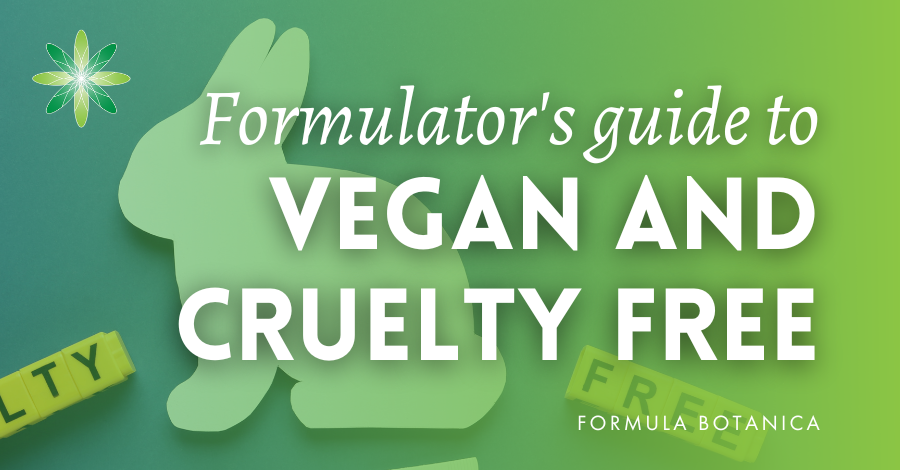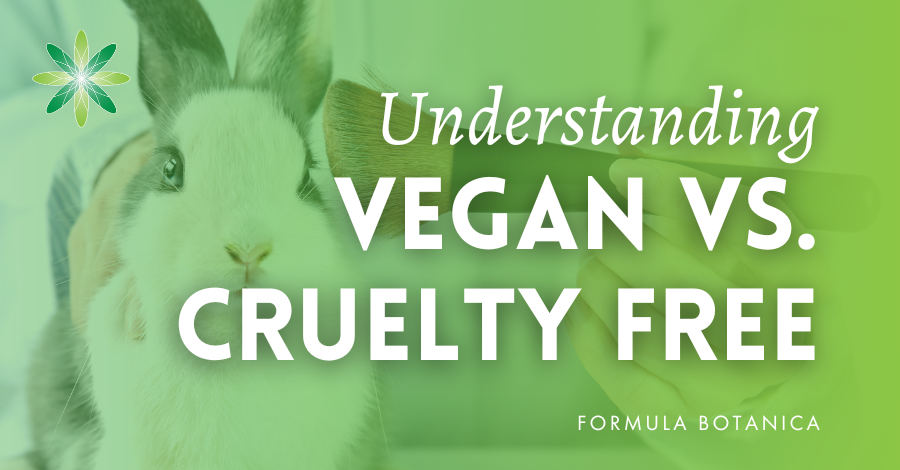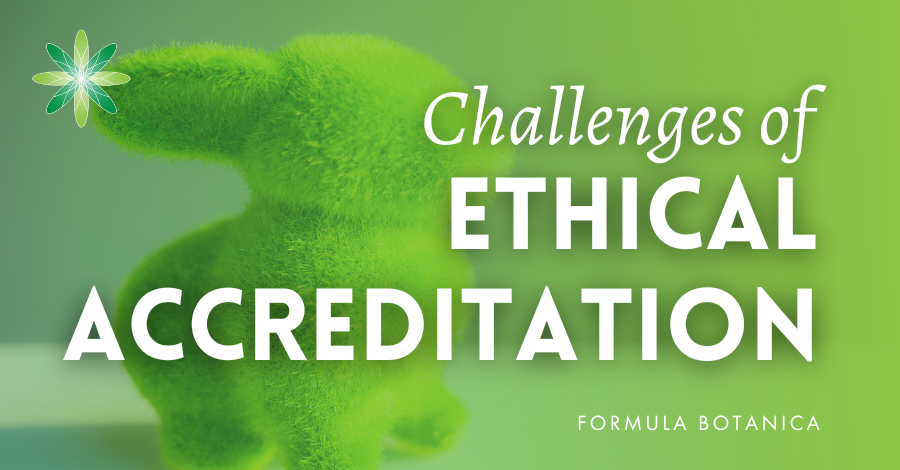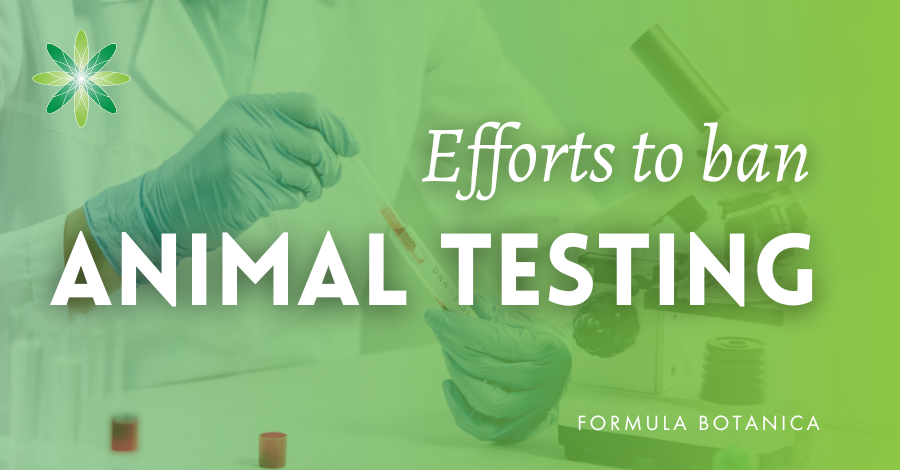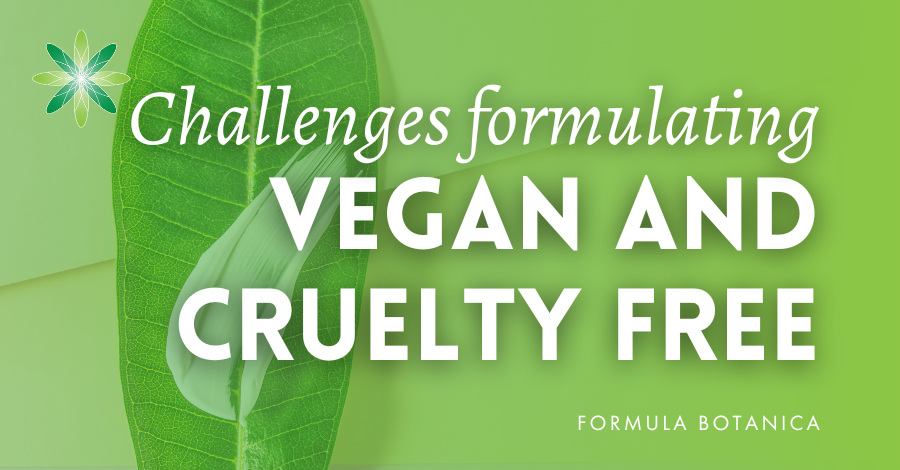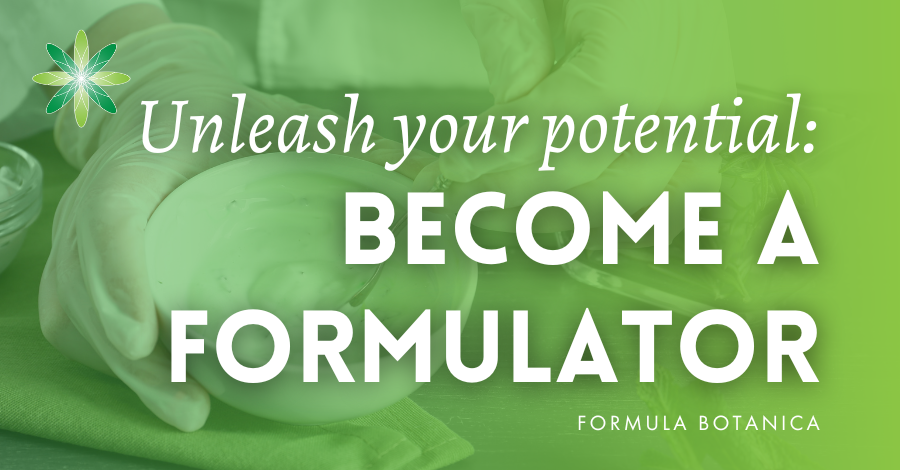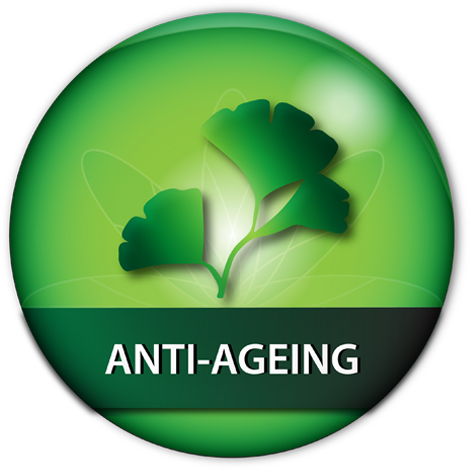As natural cosmetic formulators, we embark on a creative journey to craft pure, botanical skincare products that reflect our passion for nature’s bountiful ingredients. While “natural” inherently evokes images of plant-based goodness, it’s important to recognise that natural can also embrace some animal-derived ingredients. And don’t assume all botanicals align with the principles of cruelty-free cosmetics either. There are botanical-derived ingredients that may be required to be tested on animals for various legislative reasons in different parts of the world.
The home formulator faces complexities in navigating the world of vegan and cruelty-free cosmetic ingredients. As always, there are numerous grey areas to be aware of when deciding on your ingredients and where to source them. Your choices will be informed by your formulating mission, which is not something to define in an instant. If you are formulating to sell your cosmetics, your brand mission is a critical first step to building the foundations of a business. If you are at this stage and defining your mission, you may be interested in these podcast episodes and posts:
Episode 47: Should vegan beauty brands be run by vegans?
Podcast 123: Are we confusing natural with sustainable beauty?
Episode 23: Starting an ethical skincare business
Our podcast archives offer a host of thought-provoking episodes on similar topics, ranging from green, blue, and clean beauty to the myth of waterless beauty.
As you dive deeper into the world of natural cosmetics, it becomes increasingly crucial to address issues like these. One topic of particular significance for natural formulators is the topic we’re covering here: vegan and cruelty-free cosmetics, which can be a tricky ethical journey.
With the global market for vegan cosmetics growing an average of 6% annually to 2031, it is clear that ethical issues are a major consideration for beauty consumers – millennials in particular – when choosing products and investigating new brands. There are now apps developed by accreditation bodies to help people seek out and research products and brands that have passed their certification processes.
In the following sections, we shed light on the challenges surrounding vegan and cruelty-free accreditation, ingredient sourcing, and supply chain transparency. We equip you with background knowledge and suggest some approaches and tools to make informed decisions that align with your values as a natural cosmetic formulator. Unravel the intricacies of vegan and cruelty-free cosmetics and be empowered to create skincare products that are not only rooted in nature but also embody compassion and ethical responsibility, one small cosmetic batch at a time.
Vegan vs cruelty free: defining the differences
Understanding the differences between “vegan” and “cruelty-free” is paramount for any natural formulator aiming to create ethical cosmetics. While the two terms often go hand in hand, it’s critical to recognise their distinct meanings and the nuances they carry within the cosmetics industry.
Vegan cosmetics
Vegan cosmetics refer to products that are entirely free of any animal-derived ingredients. This means that formulations exclude substances like beeswax, honey, lanolin (an emollient derived from sheep’s wool), carmine (a colourant derived from the cochineal beetle that is often added to lipsticks and other colour cosmetics), and keratin (which, while possibly vegan, is more likely derived from, among other animal parts, ground hooves, horns, and feathers).
Vegan cosmetics are rooted in the belief that no animals should be harmed or exploited in any way during the creation of skincare products. Choosing vegan formulations aligns with the principles of compassion, environmental sustainability, and a plant-based lifestyle.
Cruelty-free cosmetics
On the other hand, cruelty-free cosmetics focus on the manufacturing process of raw cosmetic ingredients and complete cosmetic products, and the testing methods used to bring these to market.
Cruelty-free cosmetics embrace the belief that animals should not suffer or be subjected to painful experiments in the name of beauty. This commitment ensures that no harm is inflicted on animals during the testing phase of the cosmetic product.
The animal rights and cruelty-free movement has a long history dating back to the late 19th century and the start of the body, Cruelty Free International. If you have come across the phrase “Beauty Without Cruelty”, you might be surprised to hear it was first coined by British peer Lady Dowding in the 1950s, who was an animal rights campaigner and a pioneer of cosmetics that were suitable for vegetarians. She went on to found a brand of the tagline name and many big-name brands have followed in her footsteps, campaigning against animal testing, notably the Body Shop.
The grey area overlap of vegan and cruelty-free
While there is often overlap between vegan and cruelty-free cosmetics, it’s important to note that they are not interchangeable terms. A product can be cruelty-free without being vegan, even if it contains animal-derived ingredients, and a vegan product should, but may not always be cruelty-free.
Some in the industry are aware of the dilemmas and potential for misleading consumers. Is beeswax “harvested” for cosmetic ingredients without causing harm to the bees? Let’s go further to ask if some agricultural methods and the land required for the growing and harvesting of cosmetic plants do harm to animals, birds, and insects. Where do we draw the line? These are questions that you, as a natural formulator, will need to ask yourself, and research.
The distinction between vegan and cruelty-free as terms only goes to highlight the nuances and complexities of using them. As a formulator, you need to evaluate your ingredients from both perspectives. Although you can pass through vegan and cruelty-free accreditation processes, which we cover next, you need to think carefully about your mission and ethics, especially when you communicate your brand values to your customers.
Navigating Accreditation Challenges
There is a lack of standardisation in certifications surrounding vegan and cruelty-free cosmetics. Various certifying bodies and organisations have established their own criteria, making it essential for you to familiarise yourself with the different accreditation options.
While certain logos and labels may signify a product’s vegan or cruelty-free status, the criteria for obtaining these certifications can vary significantly. Exploring different certifying bodies and their criteria is a crucial step in choosing reliable accreditation.
Some of the main cruelty-free certifying entities include:
PETA – “Beauty without Bunnies” approved product database – the People for the Ethical Treatment of Animals (PETA) is the largest animal rights organisation in the world, with more than 3 million members and supporters.
Leaping Bunny Program – the Coalition for Consumer Information on Cosmetics (CCIC) promotes a single comprehensive standard and an internationally recognised Leaping Bunny logo.
Cruelty Free International – Leaping bunny certification. It is the leading organisation working solely to end animal experiments worldwide.
In addition, there are plenty of other entities that also cover cruelty-free aspects, as well as vegan, organic, and more, such as the Soil Association or the Vegan Society. The list is endless. See also our post:
15 certification schemes for sustainable beauty brands – some of which also embrace organic and vegan along with climate-friendly cosmetic certifications.
These certifying bodies have established rigorous criteria and thorough vetting processes to ensure that the products bearing their logos meet the defined standards of vegan and cruelty-free cosmetics.
To navigate accreditation challenges, follow these key tips:
1. Research each certifying body’s criteria. You will then know if they align with your own values as a natural cosmetic formulator. Consider, for example, the level of scrutiny applied to ingredients, formulations, and supply chains. Also, work out at what stage the criteria kick in. Do they apply to the whole supply chain of raw ingredients or just to the end-manufactured product? The final product may avoid animal testing, but would you feel comfortable not knowing if testing applied to some ingredients within it?
2. Read about the experiences of other formulators who have obtained certification. This will help you gain insights into their challenges and journey. The Formula Botanica Online Classroom for students as well as our public-facing group, the Skincare Entrepreneur Mastermind, are good places to ask around.
3. Reach out to certifying bodies directly. Don’t be worried about asking questions or if you need clarification about their requirements. Their aim is to foster more awareness of their vegan or cruelty-free mission and encourage beauty brands of all sizes to take up their schemes.
Which countries ban animal testing of cosmetics?
The global response to animal testing of cosmetic ingredients has been increasingly focused on phasing out this practice in favour of alternative testing methods. Several countries have implemented legislative frameworks to ban or restrict animal testing for cosmetics.
The European Union (EU) has been at the forefront of this movement. In 2013, the EU introduced a complete ban on animal testing for cosmetic products and their ingredients through the Cosmetics Regulation. This legislation made it illegal to test finished cosmetic products or their ingredients on animals within the EU. However, the EU’s Registration, Evaluation, Authorisation, and Restriction of Chemicals (REACH) system, which oversees the safety assessment of chemicals, may still allow animal testing of certain ingredients if it is deemed necessary for ensuring human health and safety.
Other countries’ approaches: several other countries have implemented bans or restrictions on animal testing for cosmetics. For example, India introduced a nationwide ban on animal testing for cosmetics in 2014. Israel followed the same year, enforcing a complete ban on the import, sale, and marketing of animal-tested cosmetics. Norway, Switzerland, and New Zealand have also implemented similar measures to restrict or ban animal testing for cosmetics within their jurisdictions.
The United States has also seen progress in the movement towards cruelty-free cosmetics, with California, in particular, taking a pioneering stance by enacting the California Cruelty-Free Cosmetics Act, 2020. This law prohibits the sale of cosmetics in the state if they have been tested on animals or contain ingredients that have undergone animal testing. While federal regulation in the United States does not explicitly ban animal testing for cosmetics, the Food and Drug Administration (FDA) encourages the use of alternative testing methods and has been working towards reducing animal testing requirements.
China has been a topic of concern within the cruelty-free community due to its regulations on cosmetics entering the market. Historically, China required mandatory animal testing on imported cosmetics. However, there have been recent positive developments. Since 2020, China has allowed companies to sell certain cosmetics produced domestically in China without animal testing, under certain conditions. Additionally, China has also made progress in accepting non-animal alternative methods for safety assessment, such as in vitro testing and computational modeling. These changes offer hope for the future elimination of animal testing requirements for cosmetics in China.
As both beauty consumers and industry insiders, we can help support and prioritise cruelty-free brands and products as they contribute to the global shift towards a more compassionate and ethically conscious beauty industry.
Formulator’s concerns: formulating with honesty
As natural formulators, we may be well-versed in botanical ingredients, but as we know, there are numerous shades of natural, and as we said above, botanical doesn’t necessarily mean an ingredient is cruelty-free either. In sourcing vegan and cruelty-free materials, it’s important to go a step further and ensure that our ingredients are not derived from animals or involve any form of animal exploitation.
We dedicate a separate post to covering what it means to formulate vegan cosmetics. It runs through a checklist of points to consider when aiming for vegan accreditation.
First, it is important for you to be able to identify and exclude animal-derived ingredients from your formulations if becoming vegan certified is your mission, and to know if all your ingredients are cruelty-free, and at what stage in their processing. This is no easy task, but transparency in the supply chain is critical to maintaining the integrity of your vegan and cruelty-free cosmetics.
Fortunately, resources are available to help formulators research vegan and cruelty-free ingredients. Online databases and ingredient glossaries can provide valuable information on plant-based substitutes for animal-derived ingredients. Our Green Beauty Conversations podcast spoke to several cosmetic ingredient portals and other organisations seeking to provide transparency, clarity, and ease in sourcing supplies. Do head over to listen to:
Episode 79: the challenge of sourcing natural ingredients – we talk to Covalo, a comprehensive search platform that connects beauty brands with over 40,000 suppliers. It offers filters to find vegan, non-animal-tested, and other criteria.
Episode 81: can the beauty industry ever be transparent? Formula Botanica CEO Lorraine Dallmeier talks to Jessi Baker, MBE, the founder and CEO of Provenance, a software solution house verifying sustainability claims for beauty brands to help empower shoppers to make sustainable, ethical choices at the point of purchase. It works on verifying numerous claims, including vegan and cruelty-free.
Look out also for ingredient suppliers advertising that they specialise in vegan and cruelty-free materials.
Tips for supply-chain transparency
Tracking the origin and processing of each ingredient can be a daunting task, especially when dealing with multiple suppliers. However, as formulators, there are some basic steps you can take.
Firstly, engage with your suppliers and build up good relations with ones that can offer vital information on their ingredients through documentation such as certificates of analysis (COA) and safety data sheets (SDS). You need these documents if you intend to formulate cosmetics to sell. Ask your suppliers specific questions about their sourcing methods, including whether the ingredients are plant-based and obtained without animal exploitation. Requesting documentation, such as certifications or third-party audits, can also help verify the claims made by suppliers regarding the vegan and cruelty-free status of their ingredients.
It is for this reason that portals such as Covalo and Provenance, which we mentioned above, have launched – to bring greater transparency to the supply chain. Their ultimate aim is to help brands make legitimate, verified claims and help consumers become better informed.
Formulators should be cautious of greenwashing and misleading marketing tactics that falsely claim products to be ethical or sustainable. By conducting thorough research, reading customer reviews, and seeking recommendations from trusted sources, you can formulate confident in the knowledge that you have identified suppliers with a proven track record of transparency and integrity.
Concluding your journey into vegan and cruelty-free cosmetics
As natural cosmetic formulators, our journey towards creating vegan and cruelty-free cosmetics is one that embraces our ethical values, our compassion, and our commitment to sustainability. In this blog post, we have explored the complexities of navigating the world of vegan and cruelty-free cosmetics, providing valuable insights to empower you if you embed these criteria in your formulating and brand mission.
Never has there been a better time to aim to engage with these powerful drivers of the cosmetics market. Both are intrinsically linked to the planet’s sustainability, which is an overriding concern for us all. You may even start investigating biotech-grown ingredients as an answer; who knows where your vegan and cruelty-free journey will take you and your formulations.
We hope we have shown that there are tools and support to guide you in sourcing transparently and verifying ingredients. Use these, seek help, do the legwork research, and you will have the power to create a positive impact on the beauty industry by prioritising vegan and cruelty-free cosmetics.
FREE FOUNDATION COURSE
How to become an
Organic Skincare Formulator
FREE TRAINING
How to become an
Organic Skincare Entrepreneur
FREE TRAINING
How to become an
Organic Skincare Entrepreneur
Leave us a comment

Liz is Formula Botanica’s Content Coordinator and joined our team in August 2020. Liz worked as a professional blogger, journalist and site developer for many years and was also part of the Formula Botanica student community. Read more about the Formula Botanica Team.

